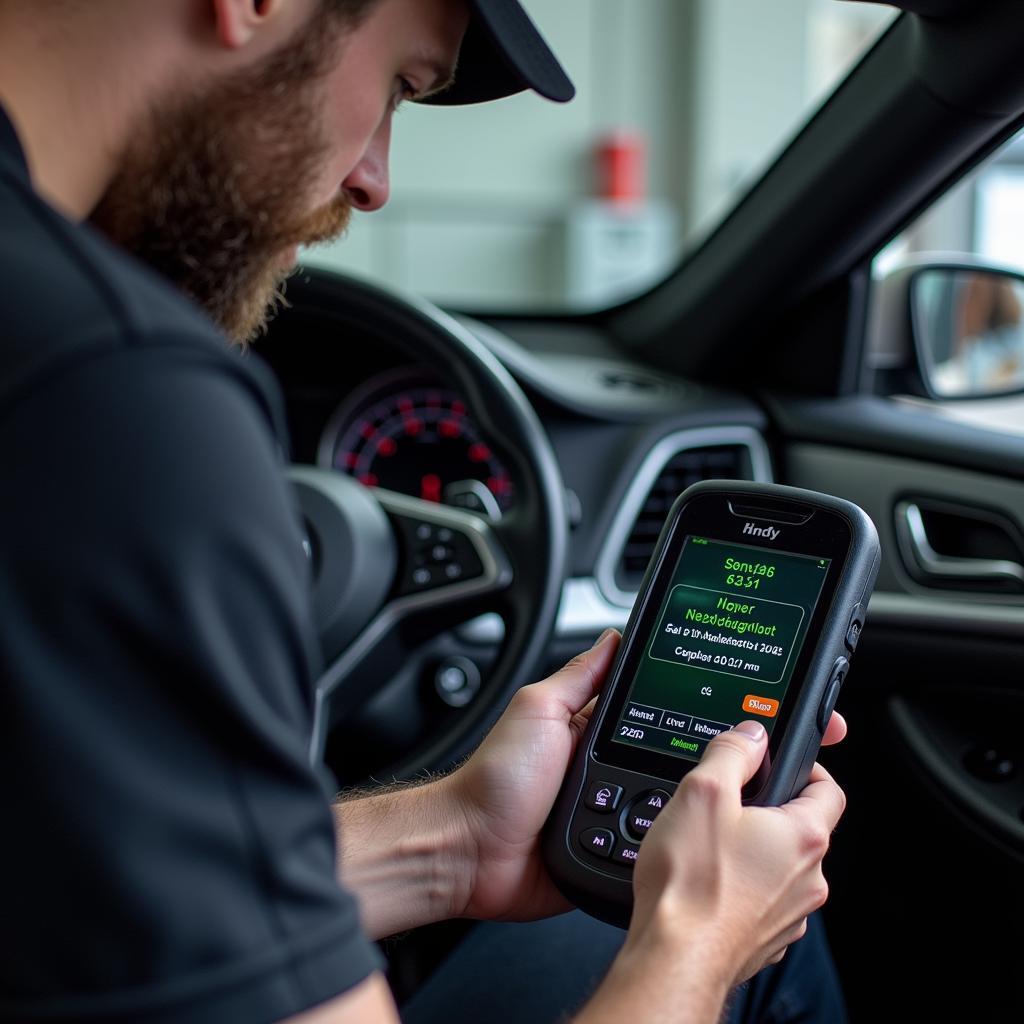The world of cars has evolved, and so have the methods of diagnosing their issues. Gone are the days of relying solely on experience and intuition. Today, Car Diagnostics Mechanics use advanced tools and technology to pinpoint problems with incredible accuracy.
This article delves into the essential aspects of car diagnostics, providing valuable insights for both car owners and aspiring mechanics.
Understanding Car Diagnostics
Car diagnostics involve using electronic tools to retrieve data from a car’s computer system. This data, often presented as Diagnostic Trouble Codes (DTCs), provides valuable insights into the health and performance of various vehicle systems.
 Car Diagnostic Tools
Car Diagnostic Tools
The Role of the Car Diagnostics Mechanic
A car diagnostics mechanic specializes in interpreting the data retrieved from car diagnostic tools. They possess a deep understanding of vehicle electronic systems, engine mechanics, and the intricate relationship between various car components.
 Car Diagnostics Mechanic Analyzing Data
Car Diagnostics Mechanic Analyzing Data
Their expertise extends beyond simply reading codes. They analyze the information, correlate it with the car’s symptoms, and formulate a comprehensive diagnosis. This systematic approach allows them to identify the root cause of the problem, leading to more effective and lasting repairs.
Essential Skills of a Car Diagnostics Mechanic
Becoming a proficient car diagnostics mechanic requires a blend of technical proficiency and analytical thinking. Some essential skills include:
- Proficiency with Diagnostic Tools: A strong foundation in operating various diagnostic tools, understanding their functions, and interpreting the data they generate is crucial.
- Knowledge of Vehicle Electronic Systems: A deep understanding of how the various electronic systems within a vehicle communicate and interact is essential for accurate diagnosis.
- Analytical and Problem-Solving Abilities: Successfully diagnosing car problems often requires piecing together information from various sources, analyzing patterns, and using logical reasoning to arrive at the root cause.
- Communication Skills: Effectively communicating complex technical information to customers in a clear and understandable manner is crucial for building trust and ensuring customer satisfaction.
Benefits of Car Diagnostics
The advent of car diagnostics has revolutionized the automotive repair industry, offering numerous benefits:
- Accurate Diagnosis: Car diagnostics eliminate much of the guesswork from car repairs. By providing precise information about the source of the problem, they enable mechanics to pinpoint issues accurately.
- Faster Repairs: Accurate diagnosis translates to quicker repairs. Mechanics can avoid wasting time on unnecessary checks and focus directly on the root cause of the problem.
- Cost Savings: While car diagnostic tools can be a significant investment, the long-term cost savings are substantial. Accurate diagnosis prevents unnecessary repairs and reduces the likelihood of recurring issues.
- Improved Safety: By identifying potential problems early on, car diagnostics play a vital role in ensuring vehicle safety and preventing breakdowns that could lead to accidents.
The Future of Car Diagnostics
 Car Diagnostics Future Technology
Car Diagnostics Future Technology
The field of car diagnostics continues to evolve at a rapid pace. As vehicles become increasingly sophisticated, so too will the tools and techniques used to diagnose them. Emerging technologies like artificial intelligence and machine learning are poised to further enhance the accuracy and efficiency of car diagnostics.
Conclusion
Car diagnostics have become an indispensable part of the automotive repair industry. The ability to accurately diagnose car problems is essential for ensuring efficient repairs, preventing future issues, and ultimately, enhancing driver safety and satisfaction. As technology continues to evolve, the role of the car diagnostics mechanic will only become more critical in keeping our vehicles running smoothly.
FAQs about Car Diagnostics
1. What is an OBD-II port?
The OBD-II port, or On-Board Diagnostics port, is a standardized 16-pin connector found in most cars manufactured after 1996. It allows access to the vehicle’s computer system for retrieving diagnostic information.
2. Can I perform car diagnostics myself?
While basic OBD-II scanners are available for consumer use, they may not provide the depth of information required for accurate diagnosis. Consulting a qualified car diagnostics mechanic is always recommended.
3. How often should I get my car diagnosed?
It’s generally recommended to have your car diagnosed annually or whenever you notice any unusual performance issues.
4. What should I do if my check engine light comes on?
While not all check engine light warnings indicate serious problems, it’s crucial to get your car diagnosed as soon as possible to identify the cause and prevent potential damage.
5. How do I find a reputable car diagnostics mechanic?
Look for certifications, ask for recommendations from trusted sources, and read online reviews to find a reliable mechanic specializing in car diagnostics in your area.
Need expert assistance with your car diagnostics? Contact us today via WhatsApp at +1(641)206-8880 or email us at [email protected]. Our team of experienced technicians is available 24/7 to provide comprehensive diagnostic services and get you back on the road with confidence.
For more information on specific car diagnostic services in your area, you can visit our pages on car diagnostics west midlands, car diagnostics gravesend, car diagnostics carrum downs, and car diagnostics worcester. We also offer a comprehensive car mechanics guide to diagnostics for those interested in learning more about this specialized field.

Leave a Reply